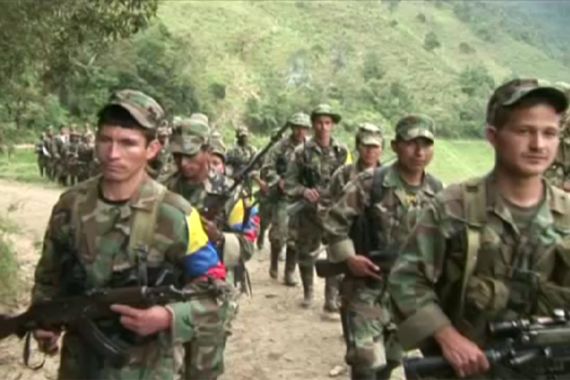Colombia’s FARC to get political role
Peace talks in Cuban capital Havana result in “fundamental agreement” on future political role for rebel movement.

Colombia’s government and FARC have reached a “fundamental agreement” on the group’s future in politics, one of the thorniest issues addressed in peace talks in Cuba, according to a joint statement.
The FARC, or Revolutionary Armed Forces of Colombia, has been fighting the government in a jungle and urban conflict that has killed more than 200,000 people in the five decades since it began as a peasant movement seeking land reform.
The partial accord may pave the way for FARC to enter Colombian politics, which chief government negotiator Humberto de la Calle said would provide a “new democratic opening” and cement peace after an end of conflict.
“Never again politics and weapons together,” he said on Wednesday.
Like other Latin American rebel groups, the FARC aspires to become a political party if a peace deal is signed.
“We are completely satisfied with what we have agreed on the point of political participation,” FARC leader Ivan Marquez told Reuters.
“We are doing well; in no other peace process have we advanced as much as we have here in Havana. We have taken an important step in the right direction to end the conflict and to achieve a real democracy in Colombia.”
President Juan Manuel Santos, facing a barrage of criticism from the opposition for negotiating with the rebels, wants to show progress in the talks that have dragged on for a year and, until now, have yielded only incomplete agreement on the first of a five-point agenda.
The center-right Santos has seen his approval ratings slump in the last few months, partly due to the perception that he has offered too many concessions to the rebels in return for little.
Partial accord has been reached on land reform from an agenda that also includes reparation to the FARC’s victims, tackling Colombia’s drug trade, and an end to fighting.
Failure of past talks
The slow pace of talks left many believing the latest effort would fail as had previous attempts to end the bloodshed.
Recent photos of FARC leaders smoking cigars and relaxing on a boat in Cuba drew anger from Colombians upset that the rebels have continued to bomb and kill while apparently enjoying their time in Havana.
Such sensitivity comes from experience. The last peace effort ended in shambles and yielded a stronger FARC.
In 1999 former President Andres Pastrana ceded the rebels a safe haven the size of Switzerland to promote talks. But they took advantage of the breathing space to train fighters, build more than 25 airstrips to fly drug shipments, and set up prison camps to hold hostages.
Wednesday’s development will likely lift Santos’ popularity and provide momentum should he decide by the November 25 deadline to seek a second presidential term. Many believe a second term hinges on progress at the negotiating table.
“Even though the agreement is partial, what was announced today is a defeat to those who have sought to darken or end the peace process and constitutes a strong basis to believe we could reach a definitive peace,” Ivan Cepeda, a leftist congressman, said.
Opposition leaders like former President Alvaro Uribe are furious that the FARC has tried to dictate government policy while it continues to bomb economic infrastructure and kill civilians and military personnel.